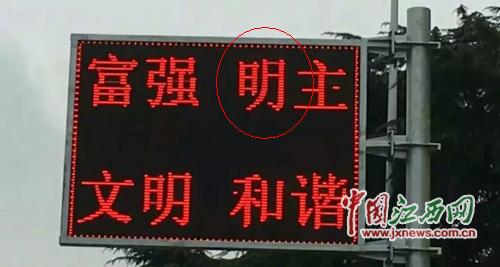A common, horrendous typo in Chinese
« previous post | next post »
In "Renewal of the race / nation" (6/24/17), we've been coming to grips with the sensitive, vital term "mínzú 民族" ("nation", "nationality"; "people"; "ethnic group"; "race"; "volk").
If we add an "h" and change the tone of the second syllable from 2nd to 3rd, we get mínzhǔ 民主 ("democracy"), another key term in modern political parlance.
Next, we add a "g" to the end of the first syllable, yielding míngzhǔ 明主 ("enlightened ruler") — this is a traditional term for an emperor, king, etc. that goes back well over two thousand years.
Politically speaking, mínzhǔ 民主 ("democracy") and míngzhǔ 明主 ("enlightened ruler") are polar opposites. If you have míngzhǔ 明主 ("enlightened ruler"), then you don't have mínzhǔ 民主 ("democracy"), and vice versa. Yet this is a very common error that often goes uncorrected (see the example sentences here). People want to type mínzhǔ 民主 ("democracy"), but they end up with míngzhǔ 明主 ("enlightened ruler").
Here's proof:
The last instance even comes complete with incorrect pinyin spelling!
All four of these very public proclamations consist of three groups of four disyllabic terms. These are the shèhuì zhǔyì héxīn jiàzhíguān 社会主义核心价值观 ("socialist core values") propounded in a directive of the Shíbā dà 十八大 ("The Eighteenth National Congress of the CPC").
Here are the first four:
fùqiáng 富强 ("prosperous and powerful")
mínzhǔ 民主 ("democracy")
wénmíng 文明 ("civilization")
héxié 和谐 ("harmonious")
For the last term, which has attained a high degree of notoriety after the Chinese government promoted it starting in 2004 as a reason why there was a need for internet censorship, see:
- "High-speed railroaded " (2/12/11)
- "River crab" (Wikipedia article)
- "River crab" (China Digital Times article)
- "Word of the Week: River Crab" (China Digital Times article)
Although mínzhǔ 民主 ("democracy") is more honored in the breach than in the observance, it is a pious shibboleth of the Communist Party theoreticians. How could so many people make this same disastrous mistake? Have they fallen prey to a Freudian slip which reveals their preference for a monarchy? Are they trying to butter up Xi Jinping by elevating him to a status that transcends even that of "Core Leader" (héxīn lǐngdǎo 核心领导")? Or are they secretly criticizing Xi Jinping for acting like a traditional monarch?
The answer to all of these questions is probably "no". Rather, the error of typing míngzhǔ 明主 ("enlightened ruler") for mínzhǔ 民主 ("democracy") is most likely due to the inability of the typist to distinguish between -n and -ng. This is a feature of many Sinitic topolects, especially in the south.
What's astonishing is that this understandable typographical error is not caught by people who read this very high profile list of "socialist core values". Regardless of how one pronounces mínzhǔ 民主 ("democracy"), surely one ought to recognize clearly that míngzhǔ 明主 ("enlightened ruler") is a completely different kettle of fish.
[H.t. Jichang Lulu; thanks to Jing Wen, Maiheng Dietrich, and Jinyi Cai]




AntC said,
July 2, 2017 @ 5:59 pm
But China de facto has a ruler/is not a democracy. (Opinions may vary as to how enlightened a ruler. But then the same can be said of the Emperors.)
So this is doublespeak. How fortunate for the CPC the terms are near-homophones.
Or for another image from George Orwell: China has reached "four legs good, two legs better".
AntC said,
July 2, 2017 @ 8:02 pm
Xi Jinping's speech in HK over the weekend couldn't be more revealing of seeing himself in the line of 'enlightened rulers':
“China was again and again beaten by countries having far smaller territories and populations than itself… The history of China at that time was filled with the nation’s humiliation and its people’s grief.”
https://qz.com/1019826/hong-kong-handover-xi-jinping-invokes-opium-wars-at-the-inauguration-of-hong-kongs-new-leader/
A proper Communist reading of that history would not identify today's China with those times. Rather: China suffered a series of despotic and corrupt rulers, who'd rather spend taxes on fancy palaces and a stone-built river steamer (of all things!) than on defending its people. The European invaders humiliated those rulers and their hegemony; not the noble Chinese people. So happy were the people of HK to have that yoke lifted off them, they embraced the enlightenment of British Colonial rule for 150 years. The CPC stands for a new way: democracy, the enlightenment we draw from the people themselves, not 'enlightened rulers'. [That last sentence is all irony, of course.]
As a Brit, I'm ashamed that our own 'enlightened ruler' of the time, Margaret Thatcher, also revealed her contempt for the wisdom of the people by handing back HK so cravenly.
Terrence G. said,
July 2, 2017 @ 8:38 pm
I think you are right in that the typo is common because many dialect speakers cannot distinguish between -n and -ng. However I think to use -ng for -n is mostly a northern feature, instead of southern. As the picture shows the typo is from Shaanxi. In many northern dialects, words with -n are pronounced as -ng. If it were a southern feature, it tends to replace -ng with -n.
Also I am not sure whether 明主 is a common traditional term for "enlightened ruler". Maybe 明君 is more common?
Dave Cragin said,
July 3, 2017 @ 10:19 pm
Hi Terrence, Thanks for pointing out that -ng for -n is mostly a northern feature. This explains my learning experience.
I learned to speak before learning pinyin. In re-listening to my lessons, certain words show the -ng/-n. E.g., Jintian 今天 (today) definitely sound like jingtian. Even when I learned the correct pinyin, the lessons still sound this way to me.
The lessons have a northern influence (they teach 一点儿,哪里儿,花儿). Hence, your explanation fits.
Terrence G. said,
July 5, 2017 @ 1:09 pm
@DaveCragin You are welcome. I have surely heard people say jingtian, or jingtie (-n is deleted).